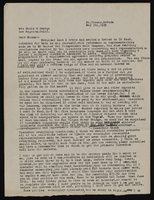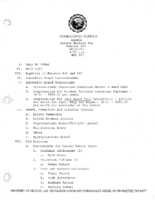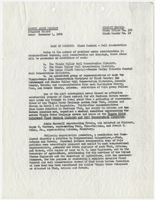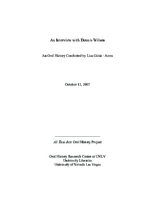Search the Special Collections and Archives Portal
Search Results

Correspondence, Levi Syphus to Sadie George
Date
Archival Collection
Description
Text

Diane Meireis oral history interview: transcript
Date
Archival Collection
Description
Oral history interview with Diane Meireis conducted by Claytee D. White on November 06, 2017 for the Remembering 1 October Oral History Project. In this interview, Meireis discusses her experience at the 1 October shooting. She remembers hearing gunfire, the confusion in the crowd, and finding a safe place to hide. Meireis describes the collaboration of strangers, and feeling guilt for not being able to help others as she escaped the venue. Lastly, Meireis discusses her opinions of firearms.
Text

Transcript of interview with Frankie Perez by Elsa Lopez and Laurents Bañuelos-Benitez, November 5, 2018
Date
Archival Collection
Description
Frankie Perez (1986- ) is an individual that constantly found himself navigating two worlds, whether it was military versus civilian; female versus male; or being Latinx in the United States. As a result of this navigation, Perez has a unique perspective on our ever more complicated world that not many individuals possess. Perez served in the military during the Do Not Ask, Do Not Tell policy which made it difficult for someone dealing with gender identity, to seek out the proper support they need. Despite the policy, and other policies that were put in place afterwards to inhibit the transgender community in the military, Perez began his transition while still serving his country. In direct contradiction of popular opinion, Perez discovered that the military easily accommodated his transition. Outside of the military Perez is an active voice in the LGBTQ community. As a member of the LGBTQ, Latinx, and military community, Perez has a unique perspective that he uses to fight for both LGBTQ and Latinx rights. Currently, Perez is finishing his degree in gender and sexuality studies at UNLV. He hopes to use his education to help people have the difficult discussions and improve conditions for his communities.
Text

Meeting minutes for Consolidated Student Senate, University of Nevada, Las Vegas, June 21, 1983
Date
Archival Collection
Description
Text

Meeting minutes for Consolidated Student Senate University of Nevada, Las Vegas, December 7, 1990
Date
Archival Collection
Description
Text

County agent project progress report, Flood control - soil conservation and soil conservation-domestic allotment, November 1, 1939
Date
Archival Collection
Description
Discussion of the formation of the Virgin River Watershed Flood Control District and Soil Conservation Committee and the efforts of all the individual soil conservation districts. Project Number: State Office No. 172. Clark County No. 12 and Project Number: State Office No. 284. Clark County No. 24
Text

Interview with Lafayette "Lafe" H. Dana, June 20, 2005
Date
Archival Collection
Description
Text

Transcript of interview with Dennis Wilson by Lisa Gioia-Acres, October 12, 2010
Date
Description
Dennis Wilson an experienced musician was born in Arabi, Louisiana in 1951. His parents both served in the Marine Corps. Dennis started playing the clarinet in the 4th grade but he did not stop there by the time he was in college he could play the alto saxophone, flute, and clarinet. He received a scholarship to Loyola University in New Orleans. The first introduction to Las Vegas was in 1971. At this time Dennis played for Wayne Cochran and the C.C. Riders traveling all around the United States with the band. In 1979 Dennis moved back to Las Vegas after a short stay in New Orleans. On his return to Las Vegas Dennis recalls his experiences playing with relief bands and performing weekly at Stardust, Dunes, Flamingo, Tropicana, Sands and Caesars. Dennis recalls what it was like working in Las Vegas and the rigorous schedule of a musician. Dennis has had a successful carrier as a musician he went on to play for Burt Bacharach and Dionne Warwick traveling the world. He then settled back in Vegas working on prominent shows such as Avenue Q, Spamalot, and Phantom of the Opera. Dennis still resides in Las Vegas and is now a paraprofessional at Johnson Junior High.
Text

Transcript of interview with Freddie Glusman by Barbara Tabach, October 29, 2015
Date
Archival Collection
Description
In this interview Glusman discusses his early memories of being raised in Vancouver, Canada and how he ended up in Las Vegas. He reflects on how he first got his start in the town and his early dealings with casinos and their owners while he was working as a carpet and drapery salesman and while working for Fabulous Magazine. Glusman explains how he started his restaurant and tells about the people he encountered while doing this that where significant to both the Jewish community and Las Vegas as a whole. He recounts stories that include such people as Meyer Lansky, Al Sachs, and Moe Dalitz.
Text

Jose Leonardo Martinez oral history interview: transcript
Date
Archival Collection
Description
Oral history interview with Jose Leonardo Martinez conducted by Barbara Tabach and Nathalie Martinez on August 19 and 29, 2020 for the Latinx Voices of Southern Nevada Oral History Project. Session 1: Jose discusses his childhood and what it was like growing up during the Salvadoran Civil War. He recounts the dangers he's faced and how he made his way to the United States after traveling through Guatemala and Mexico. Subjects discussed include: Salvadoran Civil War; Ciudad Arce, El Salvador; Guatemala; Mexico; Los Angeles, California. Session 2: Jose continues his discussion of growing up in El Salvador and the violence he witnessed in the country's army during the 1980s. He also talks about his personal life after moving to the United States and his experiences navigating gang culture in Los Angeles, California. Jose recounts his previous jobs, his schooling, how he met his wife, and his family's move to Las Vegas. Subjects discussed include: El Salvador army; gang violence.
Text
